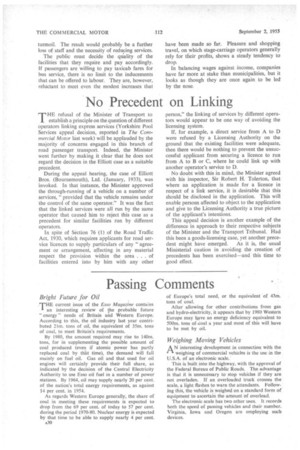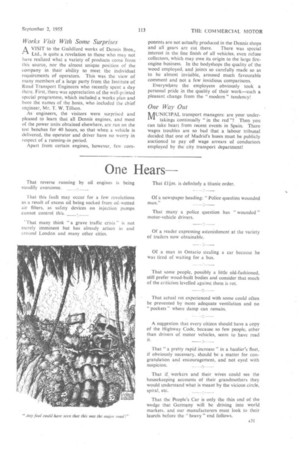Passing Comments
Page 32

Page 33

If you've noticed an error in this article please click here to report it so we can fix it.
Bright Future for Oil
.THE current issue of the Esso Magazine contains I an interesting review of the probable future "energy" needs of Britain and Western Europe. According to this, the oil industry last year contributed 21m. tons of oil, the equivalent of 35m. tons of coal, to meet Britain's requirements.
By 1980, the amount required may rise to 140m. tons, for in supplementing the possible amount of coal produced (even if atomic power has partly replaced coal by thlt time), the demand will fall mainly on fuel oil. Gas oil and that used for oil engines will certainly provide their full share, as indicated by the decision of the Central Electricity Authority to use Esso oil fuel in a number of power stations. By 1964, oil may supply nearly 20 per cent. of the nation's total energy requirements, as against 14 per cent. in 1954.
As regards Western Europe generally, the share of coal in meeting these requirements is expected to drop from the 69 per cent. of today to 57 per cent. during the period 1970-80. Nuclear energy is expected by that time to be able to supply nearly 4 per cent.
A30 of Europe's total need, or the equivalent of 43m. tons of coal.
After allowing for other contributions from gas and hydro-electricity, it appears that by 1980 Western Europe may have an energy deficiency equivalent to 500m. tons of.coal a year and most of this will have to be met by oil.
Weighing Moving Vehicles
AN interesting development in connection with the weighing of commercial vehicles is the use in the U.S.A. of an electronic scale.'
This is built into the highway, with the approval of the Federal Bureau of Public Roads. The advantage is that it is unnecessary to stop vehicles if they are not overladen. If an overloaded truck crosses the scale, a light flashes to warn the attendants. Following this, the vehicle is weighed on a standard form of equipment to ascertain the amount of overload.
The electronic scale has two other uses. It records both the speed of passing vehicles and their number. Virginia. Iowa and Oregon are employing such devices.
Works Visit With Some Surprises
A VISIT to the Guildford works of Dennis Bros., A Ltd., is quite a revelation to those who may not have realized what a variety of products come from this source, nor the almost unique position of the company in their ability to meet the individual requirements of operators. This was the view of many members of a large party from the Institute of Road Transport Engineers who recently spent a day there. First, there was appreciation of the well-printed special programme, which included a works plan and bore the names of the hosts, who included the chief engineer, Mr. T. W. Tillson.
As engineers, the visitors were surprised and pleased to learn that all Dennis engines, and most of the power units obtained elsewhere, are run on the test benches for 40 hours, so that when a vehicle is delivered, the operator and driver have no worry in respect of a running-in period.
Apart from certain engines, however, few corn
ponents are not actually produced in the Dennis shops and all gears are cut there. There was special interest in the fine finish of all vehicles, even refuse collectors, which may owe its origin to the large fireengine business. In the bodyshops the quality of the wood employed, and joints so carefully made so as to he almost invisible, aroused much favourable comment and not a few invidious comparisons.
Everywhere the employees obviously took a personal pride in the quality of their work—such a pleasant change from the " modern " tendency!
One Way Out
MUNICIPAL transport managers: are your under
takings continually "in the red "? Then you can take heart from recent events in Spain. There wages troubles are so bad that a labour tribunal decided that one of Madrid's buses must be publicly auctioned to pay off wage arrears of conductors employed by the city transport department!
















































































































